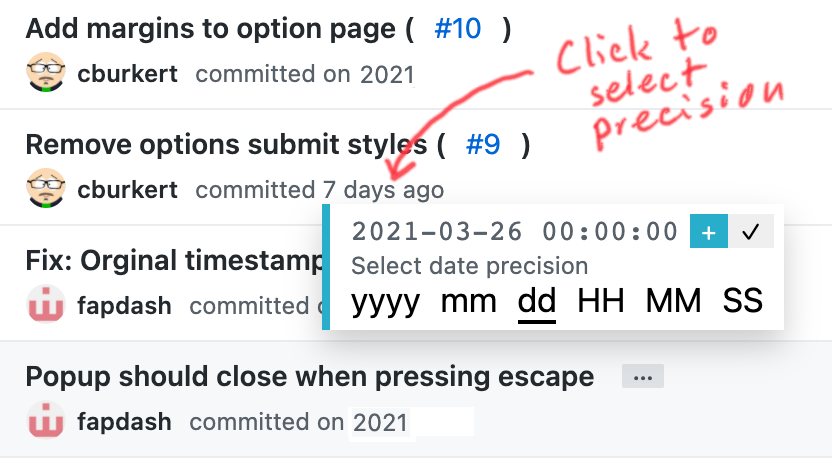Update: The study has ended on 31st of July together with the overall research project EMPRI-DEVOPS. Thanks for participating and taking an interest. Unfortunately, we had too few participants to provide any results at this point. If you like, you can continue using the extension. The study component is deactivated as of version 2.0 so that no more study data is collected or submitted.
As a User of our GitHub Privacy browser extension, you can choose to participate in our study about timestamp precision demands. The aim of this study is to gather insight into users’ reception and interaction with date and time information about user events displayed throughout GitHub’s User Interface. This insight will later on inform the potential for data minimization regarding such event timestamps. The participation in our study is voluntary and you are free to use the extension without participating. Unless you opt-in, no data will be collected or sent to our servers.
How to participate?
You can download and install the extensions for various browsers from GitHub. The source code for the browser extension is available there as well.
To participate in our study, check opt-in on the welcome page after installing the extension or anytime in the extension’s settings page.
If you subsequently wish to opt-out again, just uncheck the participation checkbox. Opting-out will stop the gathering and reporting of further data, and will delete all previously collected study data from your local browser storage. You can also choose to delete all previously submitted study data related to your random participant identifier from our servers. This will however not effect evaluation data that has already been derived from previous reports. Evaluation data is aggregated and no longer linked to the random participant identifier.
What data will be collected?
As a study participant, our browser extension will gather statistical information about the choices you make when selecting a timestamp precision in a pop-up dialogue to unredact timestamps.

We also count how often you load views on GitHub (e.g., the issue overview) to set the above frequencies of precision choices in relation to your overall GitHub usage.
All data is kept as daily aggregates (frequencies) of your choices. The following table lists in detail what data is collected during our study and for what purpose. With exception of the participant identifier, all data is collected for every daily aggregate of precision choices.
| Type | Description | Purpose |
|---|---|---|
| Participant identifier | A random identifier (UUID version 4) | Determine the number of unique participants and combine individual reports to an anonymous participant profile. |
| Days since opt-in | Number of days passed since your opt-in at the time of the precision choice | Determine duration of study participation and sort out initial erratic try-out behaviour |
| GitHub View (URL) | Label from a pre-defined list of view labels identifying the type of GitHub site on which the timestamp was located (issue list, pull request, …) | Distinguish potentially different precision demands for different kinds of timestamps |
| View counts | Number of times a view type has been loaded during one day | Baseline of a users’ GitHub usage to set precision choices into perspective. |
| Timestamp XPath | Location (XPath) of the timestamp on the site | Distinguish potentially different precision demands for different kinds of timestamps |
| Selected precision | Timestamp precision as most significant unit (day, seconds, …) | Determine user demand for timestamp precision |
| Selection frequency | Number of times a precision has been selected for this timestamp type during one day | Determine user demand for timestamp precision |
| Distance statistics | If the timestamp type is part of a list of sibling timestamps, the mean and standard deviation of the temporal distance to the closest neighbouring sibling | Determine if the precision demand correlates with the closeness of neighbouring events |
This data is reported to our servers at most daily and only when you use the extension. The following sample report illustrates what is transmitted to our servers:
{
"entries" : [
{
"mostSignificantUnit" : "day",
"frequency" : 2,
"daysSinceOptIn" : 0,
"url" : "commits",
"distanceStats" : {
"mean" : 718200,
"stddev" : 1015688
},
"xpath" : "BODY/DIV/DIV/MAIN/DIV/DIV/DIV/DIV/DIV/OL/LI/DIV/DIV/DIV/RELATIVE-TIME"
},
{
"mostSignificantUnit" : "minute",
"frequency" : 1,
"daysSinceOptIn" : 2,
"url" : "commits",
"xpath" : "BODY/DIV/DIV/MAIN/DIV/DIV/DIV/DIV/DIV/OL/LI/DIV/DIV/DIV/RELATIVE-TIME"
},
{
"mostSignificantUnit" : "day",
"frequency" : 1,
"daysSinceOptIn" : 3,
"url" : "commits",
"xpath" : "BODY/DIV/DIV/MAIN/DIV/DIV/DIV/DIV/DIV/OL/LI/DIV/DIV/DIV/RELATIVE-TIME"
},
{
"mostSignificantUnit" : "hour",
"frequency" : 2,
"daysSinceOptIn" : 3,
"url" : "repo",
"xpath" : "BODY/DIV/DIV/MAIN/DIV/DIV/DIV/DIV/DIV/DIV/DIV/DIV/DIV/DIV/A/RELATIVE-TIME"
}
],
"viewCounts" : {
"0" : {
"repo" : 3,
"commits" : 2
},
"2" : {
"issuelist" : 4,
"issue" : 5,
"commits" : 1
},
"3" : {
"repo" : 5,
"commits" : 1
}
},
"participantIdentifier" : "17b3eaea-1b77-4d60-ac7e-5d0854040d79"
}This sample report contains the participant’s choices and view counts during the first 4 days after the opt-in.
Privacy Notice
This study does not collect or process directly identifying information such as your name, IP address. We employ the following technical measures to make sure that we have no practical means of identifying individual study participants:
- The participant identifier is randomly generated and therefore, we have no knowledge which identifier belongs to which participant.
- We collect only aggregated data in the form of selection frequencies and timestamp distance statistics.
- We deliberately do not collect any timing information besides the days since opt-in count and report study data in daily batches to not give our servers any further information about usage habits.
Contact
If you have any questions about this study please e-mail Christian Burkert (christian.burkert@uni-hamburg.de).

